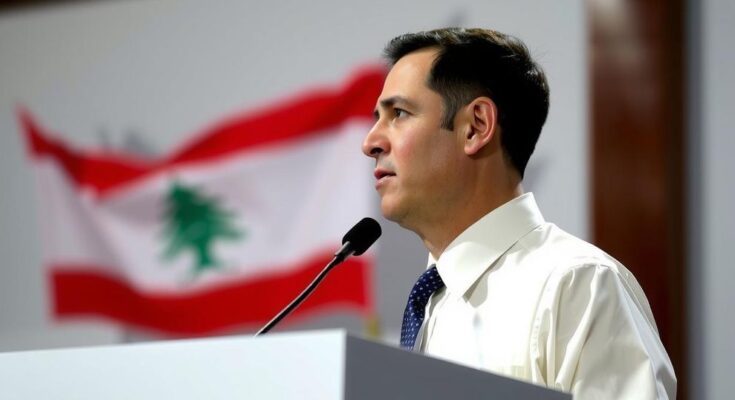Lebanon is set to elect a new president after more than two years without effective leadership. The recent ceasefire between Israel and Hezbollah has prompted renewed urgency for political resolution amidst ongoing crises in the country. Joseph Aoun, commander of the Lebanese Armed Forces, emerges as a leading candidate, reflecting a potential shift in the political landscape. The election is critical for restoring governance and addressing the nation’s economic challenges.
Lebanon is poised to elect a new president, marking an end to more than two years without a true leader. The election, scheduled for Thursday, comes amidst ongoing political and economic turmoil, where the power currently rests with Prime Minister Najib Mikati’s transitional government. This administration has struggled to effectively address the country’s myriad crises, including significant economic recession and social dislocation due to conflicts with Israel. However, the recent ceasefire between Israel and Hezbollah has created a more conducive environment for political change, underscoring the urgency of electing a president capable of ensuring stability and governance as the ceasefire is set to expire at month’s end.
Various political factions within Lebanon’s parliament have engaged in intense negotiations to identify a viable candidate. The structure of the government requires that leadership positions reflect the country’s diverse religious and ethnic composition—thereby mandating a Maronite Christian president, a Sunni Muslim prime minister, and a Shiite Muslim speaker of parliament. Joseph Aoun, the commander-in-chief of the Lebanese Armed Forces, has emerged as a prominent candidate, supported by a coalition that includes the opposition and perhaps even backing from Hezbollah.
The political dynamics shifted notably following recent confrontations between Hezbollah and Israel, which somewhat diminished Hezbollah’s political leverage, thereby removing its previous opposition to Joseph Aoun’s candidacy. Analysts have posited that Aoun’s military background grants him an esteemed position in Lebanon; he leads one of the few institutions that retains public trust. Should he be elected, he could fulfill a critical need for security and governance.
The forthcoming presidential election encapsulates Lebanon’s urgent need for a legitimate and representative governance structure, moving away from the ineffective transitional government. Experts stress the need for a government legitimized by the electorate to restore functionality to the state. With a potential new president on the horizon, there exists a glimmer of hope for revitalizing Lebanon.
Lebanon’s political landscape has been tumultuous, characterized by a longstanding absence of a functional presidency and the overarching dominance of sectarian divisions. The constitutional stipulations regarding the distribution of power among various religious groups create a complex electoral environment, further complicated by the compounded crises the nation faces. Economic collapse, internal displacement due to prior conflicts, and international relations with Israel and Hezbollah have exacerbated Lebanon’s challenges, all underscoring the pressing need for effective governance. With a ceasefire agreement recently established, the timely election of a president now takes precedence in stabilizing the country.
In conclusion, Lebanon stands at a critical juncture as it prepares to elect a new president after a prolonged period of political vacancy. The urgency of this election is underscored by the need for a credible government to address economic difficulties and ensure the implementation of a recent ceasefire agreement. Joseph Aoun’s candidacy, buoyed by a shifting political climate, serves as a hopeful prospect for many Lebanese citizens seeking stability and a path toward recovery. As Lebanon approaches this decision, the outcomes will significantly influence the nation’s future trajectory.
Original Source: www.dw.com



